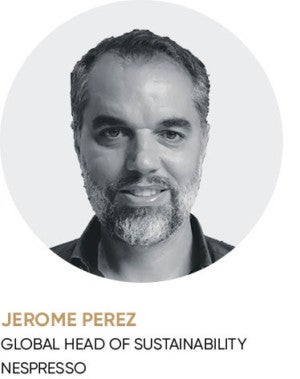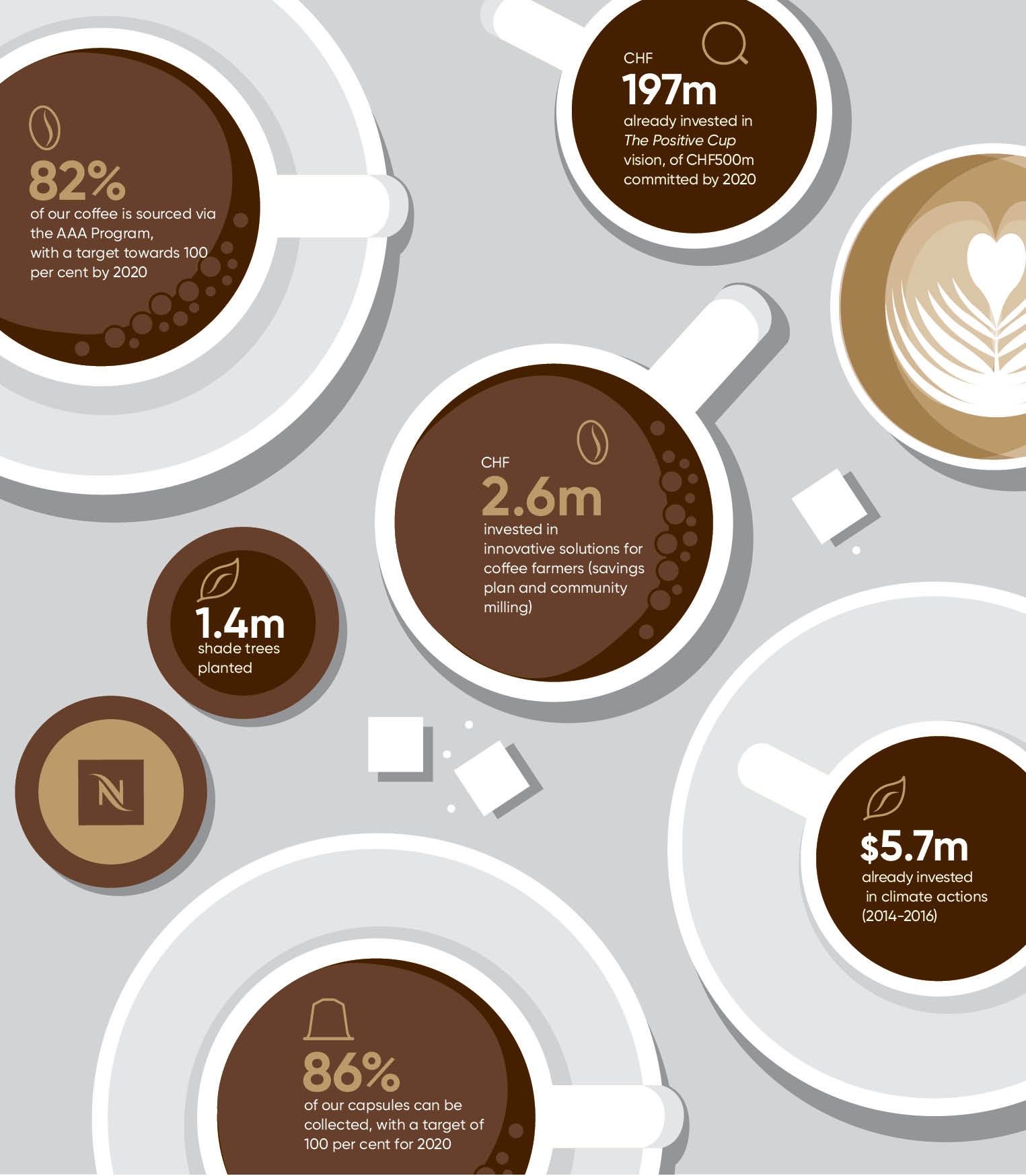 For millions around the world, coffee is a comforting beverage; a morning pick-me-up or the ideal accompaniment to a good book. For thousands of coffee farmers, however, it’s a livelihood. Nespresso’s The Positive Cup vision advocates a reality where coffee not only delivers a moment of pleasure, but also replenishes wider social and environmental resources, ensuring producers see coffee as a gateway to a peaceful and sustainable living.
For millions around the world, coffee is a comforting beverage; a morning pick-me-up or the ideal accompaniment to a good book. For thousands of coffee farmers, however, it’s a livelihood. Nespresso’s The Positive Cup vision advocates a reality where coffee not only delivers a moment of pleasure, but also replenishes wider social and environmental resources, ensuring producers see coffee as a gateway to a peaceful and sustainable living.
The backdrop for this vision was the 2015 Paris Climate Agreement when the world made a unanimous commitment to the United Nation’s Sustainable Development Goals (SDGs). The overarching aim was to end poverty, protect the planet and ensure prosperity for all. This was the conclusion to then-UN secretary-general Ban Ki Moon’s famous message: “We don’t have plan B because there is no planet B.”
Unlike the Millennium Development Goals, the SDGs directly called businesses to action alongside governments and international agencies, as key stakeholders in the consultation process. This catalyst propelled an evolution of corporate social responsibility to become the centre of core business operations.
Following this direction, consultancy Earth Security Group’s 2017 report outlines a practical approach for global business to identify the areas, metrics and steps that are instrumental to their sustainable growth. This presses organisations to align their expansion to the rising demands for social inclusion and environmental stability, now defining the geographies in which they operate alongside the wider SDGs. The challenge outlined is no easy feat, but requires businesses, governments and communities to work together, translating global aspirations into local realities.
Nespresso’s The Positive Cup vision advocates a reality where coffee not only delivers a moment of pleasure, but also replenishes wider social and environmental resources
This holistic approach is never far from the mind of Jerome Perez, global head of sustainability at Nespresso. As a premium coffee brand reliant on high-quality coffee sourcing, there are two key priorities moving forward. Ensuring coffee farming is an economically viable business for smallholders, combined with the urgency to protect bio-diversity and the ecosystems that guarantee healthy coffee terroirs.
“Back in the 2000s when Nespresso started to grow tremendously, we had to rethink our coffee-sourcing model, to allow long-term commercial growth with evolving socio-environmental systems,” says Mr Perez. This ignited their partnership with Rainforest Alliance to design the Nespresso AAA Sustainable Quality Program™. Focusing on Nespresso’s coffee-sourcing process, the scheme is anchored on long-term farmer relationships and the adoption of sustainable agricultural practices.
“This is to drive up quality and consistency for consumers, by providing a reliable quality of life for farmers in the supply chain,” says Mr Perez. Now tens of thousands of producers across 12 key sourcing countries, including many emerging markets, are part of this transformative journey.
Farmers in developing countries are vulnerable to a myriad of challenges, from climate change and degradation to youth exodus and armed conflict. Nespresso understands this and is determined to dilute this risk to their livelihoods. “We see our role as a driving force to transform the sector, to facilitate innovative solutions and turn challenges into new opportunities,” says Mr Perez. This philosophy engendered Nespresso in 2014 to partner with the Colombian government and Fairtrade International to launch the first retirement savings plan for smallholder farms in Caldas.
“What gives me satisfaction is that this work takes real life into cups of coffee – our customers can directly appreciate the production of Caldas coffee farmers with the limited edition Colombia Aguadas. I hope they understand what value is behind each cup,” says Mr Perez.
Nespresso’s current campaign, The Choices We Make, has the company’s approach at the heart of its message. It features a series of farmers’ stories expressing how the decision to invest in a coffee facility has opened the door to a world of opportunities. These personal stories are representative of the tens of thousands of AAA farmers instrumental in creating Nespresso’s high-quality coffee.
Another lesser-known fact around premium coffee-sourcing is that beans are more sustainably grown in the shade of trees. The shade not only complements growth, but captures carbon, improves nutrients in the soil and conserves water. In the long run, it also offers income diversification through timber value to farmers. “We believe in shade-grown coffee as a regenerative model and resilience asset for coffee growers,” Mr Perez explains.
Hence the AAA Program promotes agroforestry models, planting native trees in and around coffee farms. To enable the amplification of the deployment, Nespresso has taken a dual approach with the promotion of climate “smart practices” adoption, as part of the training received by farmers, and more recently the financing of trees for AAA farmers that will generate carbon credits to mitigate the company’s greenhouse gas emissions, an approach called insetting. “With insetting, we are internalising the environmental cost of our operational carbon footprint, while reinforcing the resilience of our supply chain,” says Mr Perez.
Equipped with the learnings from sustainable coffee-sourcing, in 2012 Nespresso also embarked on a similar approach to aluminium. The goal was to enable responsible and traceable aluminium-sourcing. Partnered with the International Union for Conservation of Nature, Nespresso is proud to have facilitated collaboration between fellow businesses and civic bodies, creating the Aluminum Stewardship Initiative.
For the last decade, Mr Perez and his team have been implementing transformative sustainability strategies throughout the wider company, harnessing the collaboration of employees, NGOs and investors. “In this arena, there are always new things to learn, so that we can adapt our value chain,” he says.
The last two years have shown an incredible acceleration in large corporations adopting responsible business practices. There is a clear heightened awareness within the private sector on the challenges that global business faces, as well as the potential opportunity, estimated by the Business and Sustainable Development Commission to be worth $12 trillion. There’s also an undeniable shift in purpose-led brands to ensure that the products we buy as individuals are allies for the change we want to see in the world.
As for next steps, Mr Perez notes: “The focus remains communicating these wider impacts to customers, so they make every purchase actively and consciously.” Nespresso recognises it is one piece in a complex puzzle, with daunting challenges ahead. But, with the achievements so far, Nespresso remains determined and hopeful.
For more information please visit www.nestle-nespresso.com


